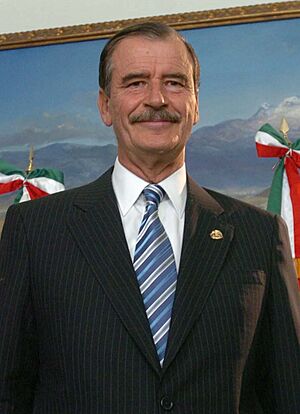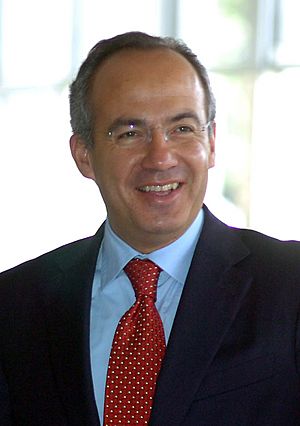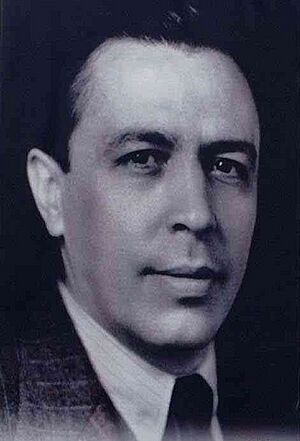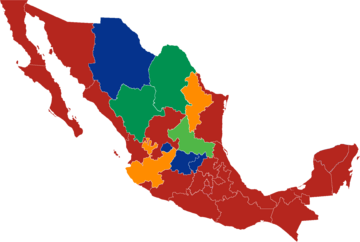National Action Party (Mexico) facts for kids
Quick facts for kids
National Action Party
Partido Acción Nacional
|
|
|---|---|
 |
|
| President | Jorge Romero Herrera |
| Secretary-General | Michel González Márquez |
| Senate leader | Guadalupe Murguía Gutiérrez |
| Chamber leader | Noemí Luna Ayala |
| Founder | Manuel Gómez Morín ... and others |
| Founded | 16 September 1939 |
| Headquarters | Av. Coyoacán No. 1546 Col. Del Valle, Benito Juárez, Mexico City |
| Newspaper | La Nación |
| Youth wing | Acción Juvenil |
| Membership | |
| Ideology | Conservatism Religious conservatism Christian democracy |
| Political position | Centre-right to right-wing |
| Religion | Roman Catholicism |
| Electoral alliance | Fuerza y Corazón por México |
| International affiliation | Centrist Democrat International ODCA (Regional) |
| Colours | Blue White |
| Anthem |
(lit. Anthem of National Action) |
| Chamber of Deputies |
71 / 500
|
| Senate |
21 / 128
|
| Governorships |
4 / 32
|
| State legislatures |
161 / 1,123
|
| Mayors |
226 / 2,052
|
The National Action Party (in Spanish, Partido Acción Nacional, or PAN) is a major political party in Mexico. Founded in 1939, it is known for its conservative ideas. Since the 1980s, the PAN has become one of the most important parties in the country, winning many elections. People who are members of this party are often called panistas.
A huge moment for the PAN came in the 2000 Mexican general election. Their candidate, Vicente Fox, won the presidency. This was the first time in 71 years that the president was not from the PRI, which had ruled Mexico for a very long time.
Six years later, another PAN candidate, Felipe Calderón, also became president. However, the party did not win the presidency in the 2012, 2018, or 2024 elections. Interestingly, both Fox and Calderón later left the PAN.
Contents
History of the PAN
How the Party Started
The National Action Party was started in 1939 by Manuel Gómez Morín. He was a well-known figure who had worked in the government. Gómez Morín believed Mexico needed a strong and lasting opposition party to challenge the government's growing power.
When he was the head of the UNAM in the 1930s, the government tried to force schools to teach socialist ideas. Gómez Morín defended the university's freedom to teach what it wanted. This brought him together with many people who would later help him create the PAN.
The party's early ideas were influenced by Christian democracy. This means they believed in solving problems using Christian values, but they rejected ideas like class warfare. Many of the first members were professionals and business owners from cities.
Growing into a Major Party
For many years, the PAN was a small opposition party. It didn't win many big elections. But it was known for supporting democracy and fair elections, which made it different from the ruling PRI party.
In the 1980s, things began to change. The PAN started winning local and state elections, especially in northern Mexico. This showed that more people were starting to support them.
Here are some of the PAN's "firsts":
- In 1946, the PAN won its first four seats in the Chamber of Deputies, Mexico's main law-making body.
- In 1989, Ernesto Ruffo Appel became the first PAN governor of a state (Baja California).
- Between 1992 and 2000, the PAN won governor elections in many other states, like Guanajuato, Jalisco, and Nuevo León.
Winning the Presidency in 2000

The year 2000 was a turning point for Mexican politics. The PAN's candidate, Vicente Fox, won the presidential election. He received 42.5% of the vote. His victory was a huge deal because it showed that Mexico's democracy was growing stronger.
In the same election, the PAN also won many seats in the Senate and the Chamber of Deputies. This gave them more power to make laws and influence the country's direction.

In the 2006 election, the PAN won again with their candidate, Felipe Calderón. It was a very close election. During his presidency, the PAN had the largest number of seats in both houses of Congress.
After Calderón's term, the PAN lost the presidency in 2012 to the PRI. The party has not won the presidential election since then.
What the PAN Believes
The PAN is generally seen as a party on the centre-right to right-wing of Mexican politics. The party's main ideology is called "National Action." This idea means the party doesn't stick to just one set of political beliefs. Instead, it tries to find practical solutions to the country's problems, whether those solutions are seen as "left" or "right."
This approach is based on the principles of Christian democracy, which combines conservative values with a focus on social justice.
Economic Ideas
The PAN supports a free enterprise system. This means they believe businesses should have the freedom to operate with less government control. They often support policies like:
- Privatization: Selling government-owned companies to private owners.
- Small government: Reducing the size and power of the government.
- Free Trade: Making agreements with other countries to trade goods easily.
The PAN is a member of international groups that share these ideas, like the Christian Democrat Organization of America.
Social Ideas
On social issues, the PAN holds conservative views. The party often supports traditional family values. For example, the PAN has generally opposed measures that would change the traditional definition of marriage. When new laws about social issues have been proposed in Mexico, the PAN has often voted against them or tried to challenge them.
Election Results
The PAN has participated in most presidential elections since the 1950s. The party has won the presidency twice.
Presidential Elections
| Election Year | Candidate | Result |
|---|---|---|
| 2000 | Vicente Fox | |
| 2006 | Felipe Calderón | |
| 2012 | Josefina Vázquez Mota | |
| 2018 | Ricardo Anaya | |
| 2024 | Xóchitl Gálvez |
Images for kids
See also
 In Spanish: Partido Acción Nacional para niños
In Spanish: Partido Acción Nacional para niños
- History of democracy in Mexico
- List of political parties in Mexico
 | Leon Lynch |
 | Milton P. Webster |
 | Ferdinand Smith |





